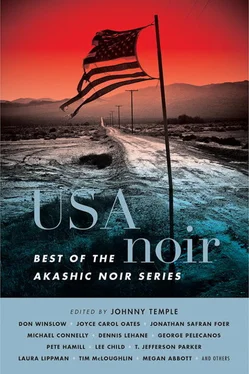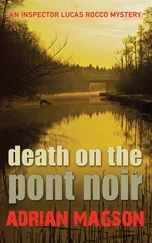Johnny Temple - USA Noir - Best of the Akashic Noir Series
Здесь есть возможность читать онлайн «Johnny Temple - USA Noir - Best of the Akashic Noir Series» весь текст электронной книги совершенно бесплатно (целиком полную версию без сокращений). В некоторых случаях можно слушать аудио, скачать через торрент в формате fb2 и присутствует краткое содержание. Город: New York, Год выпуска: 2013, ISBN: 2013, Издательство: Akashic Books, Жанр: Триллер, Детектив, на английском языке. Описание произведения, (предисловие) а так же отзывы посетителей доступны на портале библиотеки ЛибКат.
- Название:USA Noir: Best of the Akashic Noir Series
- Автор:
- Издательство:Akashic Books
- Жанр:
- Год:2013
- Город:New York
- ISBN:978-1-61775-189-9
- Рейтинг книги:3 / 5. Голосов: 1
-
Избранное:Добавить в избранное
- Отзывы:
-
Ваша оценка:
- 60
- 1
- 2
- 3
- 4
- 5
USA Noir: Best of the Akashic Noir Series: краткое содержание, описание и аннотация
Предлагаем к чтению аннотацию, описание, краткое содержание или предисловие (зависит от того, что написал сам автор книги «USA Noir: Best of the Akashic Noir Series»). Если вы не нашли необходимую информацию о книге — напишите в комментариях, мы постараемся отыскать её.
USA Noir: Best of the Akashic Noir Series — читать онлайн бесплатно полную книгу (весь текст) целиком
Ниже представлен текст книги, разбитый по страницам. Система сохранения места последней прочитанной страницы, позволяет с удобством читать онлайн бесплатно книгу «USA Noir: Best of the Akashic Noir Series», без необходимости каждый раз заново искать на чём Вы остановились. Поставьте закладку, и сможете в любой момент перейти на страницу, на которой закончили чтение.
Интервал:
Закладка:
“I want to do this picture for them and… well… for the whole state of Louisiana. You know what? That poor state’s been screwed enough different ways it could write a sequel to the Kama Sutra . It’s been screwed by FEMA, it’s been screwed by the Corps of Engineers, it’s been screwed by the administration, it’s been screwed by its own crooked officials… Everybody’s picking carrion off its bones. And those poor Wardells! I want to do this for the Wardells. Those people have a house to rebuild. They need the money and they need the… well, the lift. The vindication.”
Marty Carrera looks at the paperwork she’s given him. She proposes to pay the Wardells a $15,000 flat fee, which seems low to him. Standard would be about $75,000, plus a percentage of the gross and maybe a $10,000 “technical consultant” fee. He shuffles pages, wondering if she’s done what he suspects.
And yes, of course she has. She’s inflated her own fee at the expense of the Wardells. She thinks she should get $100,000 as an associate producer, about twice what the job is worth. And not only that, she wants to award the technical consultant’s fee to herself.
Marty is genuinely angry about this. She’s roused his sympathy for the wrongfully accused couple, and even for the beleaguered state, and he too believes the Wardells’ story—or more properly, Mathilde and Cherice’s story—would make a great movie for television.
However, he thinks Ms. Smith-Fredericks is a species of vermin. “After looking at the figures,” he says, “I think I can honestly say that you seem uniquely qualified to do a piece on looting.”
But she doesn’t catch his meaning. She’s so full of herself all she hears is what she wants to hear. She sticks out her hand to shake.
Well, so be it, Marty thinks. I tried to warn her.
His production company doesn’t need her. So what if she found the story and brought it to him? He’s not obligated to… Well, he is, but…
“Marty,” she says, “we’re going to be great together.”
He shakes her hand absentmindedly, already thinking of ways to cut her out of the deal.
THE PRISON
by Domenic Stansberry
It was 1946, and Alcatraz was burning. I had just got back into town and stood in the crowd along the seawall, looking out toward the island. The riot at the prison had been going on for several days, and now a fire had broken out and smoke plumed out over the bay. There were all kinds of rumors running through the crowd. The prisoners had taken over. Warden Johnston was dead. Capone’s gang had seized a patrol boat and a group of escapees had landed down at Baker Beach. The radio contradicted these reports, but from the seawall you could see that a marine flotilla had surrounded Alcatraz Island and helicopters were pouring tracer fire into the prison. The police had the wharf cordoned off but it didn’t prevent the crowds from gathering. The off-duty sailors and Presidio boys mixing with the peace-time johnnies. The office girls and Chinese skirts. The Sicilians with their noses like giant fish.
In the crowd were people I knew from the old days. Some of them met my eyes, some didn’t. My old friend Johnny Maglie stood in a group maybe ten yards away. He gave me a nod, but it wasn’t him I was looking at. There was a woman, maybe twenty-five years old, black hair, wearing a red cardigan. Her name was Anne but I didn’t know this yet. Her eyes met mine and I felt something fall apart inside me.
My father had given me a gun before I left Reno. He had been a figure in North Beach before the war—an editor, a man with opinions, and he used to carry a little German revolver in his vest pocket. The gun had been confiscated after Pearl Harbor, but he’d gotten himself another somewhere along the way and pressed it into my hand in the train station. A gallant, meaningless gesture.
“Take this,” he said.
“I don’t need a gun.”
“You may be a war hero,” he said, “but there are people in North Beach who hate me. Who have always hated me. They will go after you.”
I humored the old man and took the gun. Truth was, he was ill. He and Sal Fusco had sent me to borrow some money from a crab fisherman by the name of Giovanni Pellicano. More than that, though, my father wanted me to talk with my mother. He wanted me to bring her on the train back to Reno.
Johnny Maglie broke away from his little group—the ex-soldiers with their chests out and the office janes up on their tiptoes, trying to get a glimpse of the prison. Maglie was a civilian now, looking good in his hat, his white shirt, his creases. My old friend extended his hand and I thought about my father’s gun in my pocket.
I have impulses sometimes, ugly thoughts.
Maybe it was the three years I’d spent in the Pacific. Or maybe it was just something inside me. Still inside me.
Either way, I imagined myself sticking the gun in my old friend’s stomach and pulling the trigger.
“So you’re back in town,” said Maglie.
“Yeah, I’m back.”
Maglie put his arm around me. He and I had grown up together, just down the street. We had both served in the Pacific theater, though in different divisions. He had served out the campaign, but I’d come back in ’44—after I was wounded the second time around, taking some shrapnel in my chest. This was my first time back to The Beach. Johnny knew the reason I had stayed away, I figured, but it wasn’t something we were going to talk about.
“We fought the Japs, we win the goddamn war—but it looks like the criminals are going to come back and storm the city.”
I had liked Maglie once, but I didn’t know how I felt about him anymore.
“You going to stick around town for a while?”
“Haven’t decided,” I said.
“How’s your mom?”
“Good.”
He didn’t mention my father. No one mentioned my father.
“You know,” he stuttered, and I saw in his face the mix of shame and awkwardness that I’d seen more than once in the faces of the people who’d known my family—who’d moved in the same circles. And that included just about everybody in The Beach. Some of them, of course, played it the other way now. They held their noses up, they smirked. “You know,” he said, “I was getting some papers drawn up yesterday—down at Uncle’s place—and your name came up…”
He stopped then. Maybe it was because he saw my expression at the mention of his uncle, the judge. Or maybe it was because the cops were herding us away, or because a blonde in Maglie’s group gave a glance in his direction.
“Join us,” he said. “We’re going to Fontana’s.”
I was going to say no. And probably I should have. But the girl in the red cardigan was a member of their group.
For twenty years, my father had run the Italian-language paper, Il Carnevale . He had offices down at Columbus, and all the Italian culturatti used to stop by when they came through the city. Enrico Caruso. The great Marconi. Even Vittorio Mussolini, the aviator.
My father had been a public man. Fridays, to the opera. Saturdays, to Cavelli’s Books—to stand on the sidewalk and listen to Il Duce’s radio address. On Tuesdays, he visited the Salesian school. The young boys dressed in the uniforms of the Faciso Giovanile, and my father gave them lectures on the beauty of the Italian language.
I signed up in December, ’41.
A few weeks later my father’s office was raided. His paper was shut down. Hearings were held. My father and a dozen others were sent to a detention camp in Montana. My mother did not put this news in her letters. Sometime in ’43 the case was reviewed and my father was released, provided he did not take up residence in a state contiguous to the Pacific Ocean. When I came home, with my wounds and my letters of commendation, my stateside commander suggested it might a good idea, all things considered, if I too stayed away from the waterfront.
Читать дальшеИнтервал:
Закладка:
Похожие книги на «USA Noir: Best of the Akashic Noir Series»
Представляем Вашему вниманию похожие книги на «USA Noir: Best of the Akashic Noir Series» списком для выбора. Мы отобрали схожую по названию и смыслу литературу в надежде предоставить читателям больше вариантов отыскать новые, интересные, ещё непрочитанные произведения.
Обсуждение, отзывы о книге «USA Noir: Best of the Akashic Noir Series» и просто собственные мнения читателей. Оставьте ваши комментарии, напишите, что Вы думаете о произведении, его смысле или главных героях. Укажите что конкретно понравилось, а что нет, и почему Вы так считаете.












